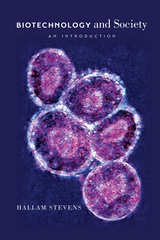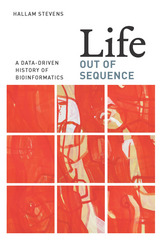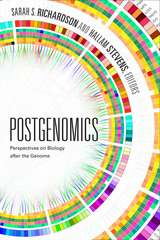3 books about Stevens, Hallam

Biotechnology and Society
An Introduction
Hallam Stevens
University of Chicago Press, 2016
With Biotechnology and Society, Hallam Stevens offers an up-to-date primer to help us understand the interactions of biotechnology and society and the debates, controversies, fears, and hopes that have shaped how we think about bodies, organisms, and life in the twenty-first century. Stevens addresses such topics as genetically modified foods, cloning, and stem cells; genetic testing and the potential for discrimination; fears of (and, in some cases, hopes for) designer babies; personal genomics; biosecurity; and biotech art. Taken as a whole, the book presents a clear, authoritative picture of the relationship between biotechnology and society today, and how our conceptions (and misconceptions) of it could shape future developments. It is an essential volume for students and scholars working with biotechnology, while still being accessible to the general reader interested in the truth behind breathless media accounts about biotech’s promise and perils.
[more]

Life Out of Sequence
A Data-Driven History of Bioinformatics
Hallam Stevens
University of Chicago Press, 2013
Thirty years ago, the most likely place to find a biologist was standing at a laboratory bench, peering down a microscope, surrounded by flasks of chemicals and petri dishes full of bacteria. Today, you are just as likely to find him or her in a room that looks more like an office, poring over lines of code on computer screens. The use of computers in biology has radically transformed who biologists are, what they do, and how they understand life. In Life Out of Sequence, Hallam Stevens looks inside this new landscape of digital scientific work.
Stevens chronicles the emergence of bioinformatics—the mode of working across and between biology, computing, mathematics, and statistics—from the 1960s to the present, seeking to understand how knowledge about life is made in and through virtual spaces. He shows how scientific data moves from living organisms into DNA sequencing machines, through software, and into databases, images, and scientific publications. What he reveals is a biology very different from the one of predigital days: a biology that includes not only biologists but also highly interdisciplinary teams of managers and workers; a biology that is more centered on DNA sequencing, but one that understands sequence in terms of dynamic cascades and highly interconnected networks. Life Out of Sequence thus offers the computational biology community welcome context for their own work while also giving the public a frontline perspective of what is going on in this rapidly changing field.
[more]

Postgenomics
Perspectives on Biology after the Genome
Sarah S. Richardson and Hallam Stevens, editors
Duke University Press, 2015
Ten years after the Human Genome Project’s completion the life sciences stand in a moment of uncertainty, transition, and contestation. The postgenomic era has seen rapid shifts in research methodology, funding, scientific labor, and disciplinary structures. Postgenomics is transforming our understanding of disease and health, our environment, and the categories of race, class, and gender. At the same time, the gene retains its centrality and power in biological and popular discourse. The contributors to Postgenomics analyze these ruptures and continuities and place them in historical, social, and political context. Postgenomics, they argue, forces a rethinking of the genome itself, and opens new territory for conversations between the social sciences, humanities, and life sciences.
Contributors. Russ Altman, Rachel A. Ankeny, Catherine Bliss, John Dupré, Michael Fortun, Evelyn Fox Keller, Sabina Leonelli, Adrian Mackenzie, Margot Moinester, Aaron Panofsky, Sarah S. Richardson, Sara Shostak, Hallam Stevens
Contributors. Russ Altman, Rachel A. Ankeny, Catherine Bliss, John Dupré, Michael Fortun, Evelyn Fox Keller, Sabina Leonelli, Adrian Mackenzie, Margot Moinester, Aaron Panofsky, Sarah S. Richardson, Sara Shostak, Hallam Stevens
[more]
READERS
Browse our collection.
PUBLISHERS
See BiblioVault's publisher services.
STUDENT SERVICES
Files for college accessibility offices.
UChicago Accessibility Resources
home | accessibility | search | about | contact us
BiblioVault ® 2001 - 2024
The University of Chicago Press









